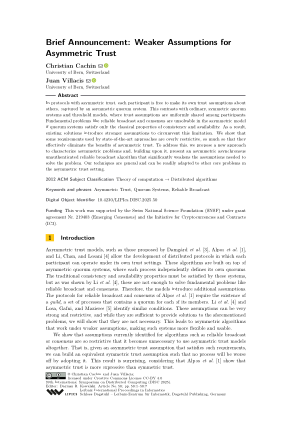Brief Announcement: Weaker Assumptions for Asymmetric Trust
Authors
Christian Cachin  ,
Juan Villacis
,
Juan Villacis 
-
Part of:
Volume:
39th International Symposium on Distributed Computing (DISC 2025)
Part of: Series: Leibniz International Proceedings in Informatics (LIPIcs)
Part of: Conference: International Symposium on Distributed Computing (DISC) - License:
 Creative Commons Attribution 4.0 International license
Creative Commons Attribution 4.0 International license
- Publication Date: 2025-10-22
File

PDF
LIPIcs.DISC.2025.50.pdf
- Filesize: 0.66 MB
- 7 pages
Document Identifiers
Subject Classification
ACM Subject Classification
- Theory of computation → Distributed algorithms
Keywords
- Asymmetric Trust
- Quorum Systems
- Reliable Broadcast
Metrics
- Access Statistics
-
Total Accesses (updated on a weekly basis)
0PDF Downloads0Metadata Views
Abstract
In protocols with asymmetric trust, each participant is free to make its own trust assumptions about others, captured by an asymmetric quorum system. This contrasts with ordinary, symmetric quorum systems and threshold models, where trust assumptions are uniformly shared among participants. Fundamental problems like reliable broadcast and consensus are unsolvable in the asymmetric model if quorum systems satisfy only the classical properties of consistency and availability. As a result, existing solutions introduce stronger assumptions to circumvent this limitation. We show that some requirements used by state-of-the-art approaches are overly restrictive, so much so that they effectively eliminate the benefits of asymmetric trust. To address this, we propose a new approach to characterize asymmetric problems and, building upon it, present an asymmetric asynchronous unauthenticated reliable broadcast algorithm that significantly weakens the assumptions needed to solve the problem. Our techniques are general and can be readily adapted to other core problems in the asymmetric trust setting.
Cite As Get BibTex
Christian Cachin and Juan Villacis. Brief Announcement: Weaker Assumptions for Asymmetric Trust. In 39th International Symposium on Distributed Computing (DISC 2025). Leibniz International Proceedings in Informatics (LIPIcs), Volume 356, pp. 50:1-50:7, Schloss Dagstuhl – Leibniz-Zentrum für Informatik (2025)
https://doi.org/10.4230/LIPIcs.DISC.2025.50
BibTex
@InProceedings{cachin_et_al:LIPIcs.DISC.2025.50,
author = {Cachin, Christian and Villacis, Juan},
title = {{Brief Announcement: Weaker Assumptions for Asymmetric Trust}},
booktitle = {39th International Symposium on Distributed Computing (DISC 2025)},
pages = {50:1--50:7},
series = {Leibniz International Proceedings in Informatics (LIPIcs)},
ISBN = {978-3-95977-402-4},
ISSN = {1868-8969},
year = {2025},
volume = {356},
editor = {Kowalski, Dariusz R.},
publisher = {Schloss Dagstuhl -- Leibniz-Zentrum f{\"u}r Informatik},
address = {Dagstuhl, Germany},
URL = {https://drops.dagstuhl.de/entities/document/10.4230/LIPIcs.DISC.2025.50},
URN = {urn:nbn:de:0030-drops-248667},
doi = {10.4230/LIPIcs.DISC.2025.50},
annote = {Keywords: Asymmetric Trust, Quorum Systems, Reliable Broadcast}
}
Author Details
Funding
This work was supported by the Swiss National Science Foundation (SNSF) under grant agreement Nr . 219403 (Emerging Consensus) and the Initiative for Cryptocurrencies and Contracts (IC3).
References
- Orestis Alpos, Christian Cachin, Björn Tackmann, and Luca Zanolini. Asymmetric distributed trust. Distributed Comput., 37(3):247-277, 2024. URL: https://doi.org/10.1007/S00446-024-00469-1.
- Gabriel Bracha and Sam Toueg. Asynchronous consensus and broadcast protocols. J. ACM, 32(4):824-840, 1985. URL: https://doi.org/10.1145/4221.214134.
- Ivan Damgård, Yvo Desmedt, Matthias Fitzi, and Jesper Buus Nielsen. Secure protocols with asymmetric trust. In Advances in Cryptology - ASIACRYPT 2007, 13th International Conference on the Theory and Application of Cryptology and Information Security, Kuching, Malaysia, December 2-6, 2007, Proceedings, volume 4833 of Lecture Notes in Computer Science, pages 357-375. Springer, 2007. URL: https://doi.org/10.1007/978-3-540-76900-2_22.
- Xiao Li, Eric Chan, and Mohsen Lesani. Quorum subsumption for heterogeneous quorum systems. In Rotem Oshman, editor, 37th International Symposium on Distributed Computing, DISC 2023, October 10-12, 2023, L'Aquila, Italy, volume 281 of LIPIcs, pages 28:1-28:19. Schloss Dagstuhl - Leibniz-Zentrum für Informatik, 2023. URL: https://doi.org/10.4230/LIPICS.DISC.2023.28.
- Giuliano Losa, Eli Gafni, and David Mazières. Stellar consensus by instantiation. In Jukka Suomela, editor, 33rd International Symposium on Distributed Computing, DISC 2019, October 14-18, 2019, Budapest, Hungary, volume 146 of LIPIcs, pages 27:1-27:15. Schloss Dagstuhl - Leibniz-Zentrum für Informatik, 2019. URL: https://doi.org/10.4230/LIPICS.DISC.2019.27.
- Michael Senn and Christian Cachin. Asymmetric failure assumptions for reliable distributed systems. In Davide Frey and Gowtham Kaki, editors, Proceedings of the 12th Workshop on Principles and Practice of Consistency for Distributed Data, PaPoC 2025, World Trade Center, Rotterdam, The Netherlands, 30 March 2025- 3 April 2025, pages 8-14. ACM, 2025. URL: https://doi.org/10.1145/3721473.3722143.
